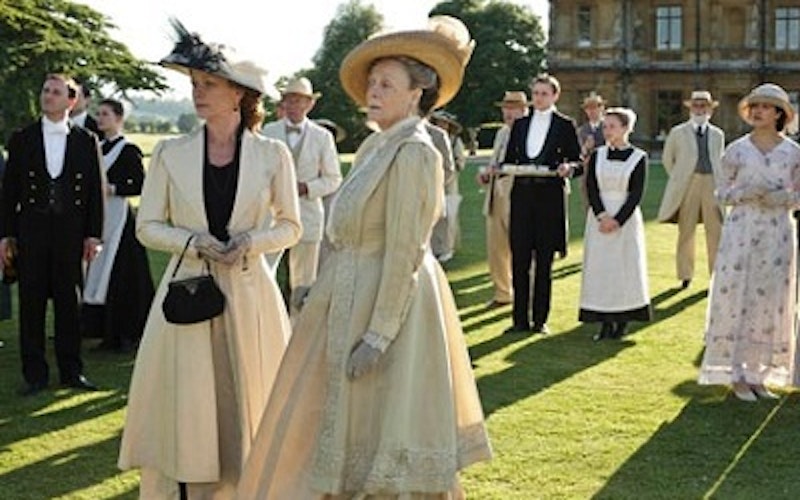
TV
Adoration and Descent at Downton Abbey
I am a Downton Abbey adorer. And judging by my social-media feeds, I'm not alone. Everyone, it seems, loves to follow the Edwardian-era lives of the aristocratic Crawley family and their servants as they together inhabit a magnificent manor home. So what is the allure of Downton, anyway?
True confession: for me, the pretty clothes and men with dashing accents do have something to do with it. The elegant cinematography also helps. And who can resist a script that allows actress Maggie Smith hilariously brusque zingers. (I'm determined to talk broadly to keep this piece spoiler-free, but you can safely watch a Maggie Smith dialogue snippet online.)
Screenwriter Julian Fellows (of Gosford Park fame) is in top form, steering a polished, original, wise and genre-defying series.
I suppose that of all I adore in the series I most adore the plot. As the story unfolds it bitingly exposes the timeless, cross-cultural notion of human adoration. Every episode asks: What do these characters worship? What do they want? And how do they going about getting it?
It’s helpful, here, to parse out the customs and expectations prized by the separate societies - the “upstairs” and “downstairs” characters, as fans and critics call them.
Much is revealed by the very way those upstairs prepare to enter a room. The Crawley family adores being adorned. In shot after shot, servants carefully apply necklaces, hairpieces and hats to Countess Crawley and her three twentysomething daughters. Earl Crawley has cufflinks to suit every occasion. After all, they all must fit the rooms they’re walking into, where intricate wall tapestries grace walls and diamonds decorate every plate.
Upstairs, propriety is power and beauty is etiquette. These are men and women questing for dignity, forced by class into near servitude who long for their talents to be recognized and rewarded.
Upstairs, propriety is power and beauty is etiquette.
This situation could be tiresomely moralistic and simplistic, with those upstairs drawing contempt from the viewer for their snobbish, materialistic ways and those downstairs ennobled and admired for their service. Thankfully, however, those below the great halls and ballrooms don’t get the posture of humble adoration right all of the time. They, too, have misplaced and selfish desires. They are felled by pride-driven decisions similar to those made by their masters.
And similar gestures of generosity and compassion redeem those on either level. The upstairs tenants are not so spoiled that they are without their moments of sacrifice and selflessness, especially when acting in the interest of a family member’s happiness.
Even a broad sweep of the story lines reveals the symmetry of vice and virtue in the manor's inhabitants. I think of Mary, the eldest Crawley daughter, whose longing for approval threatens her chance at true, life-giving and other-serving love. I think of lady maid O’Brien, who acts as a cantankerous crow to those under her authority but who is loyal - even tender - to Countess Grantham. These are dimensional characters, both spiteful and kind.
All of the characters suffer when they forget that the "etiquette" of true adoration is not elevation or even elegance - it is descent. A readiness to stoop for love. A recognition that, as T.S. Eliot said, “the way up is the way down.”
I see in Downton the struggle to model our lives after the God of Isaiah 57:15, who lives “in a high and holy place, but also with the one who is contrite and lowly in spirit.” This struggle does more than allure us, but allows so many of us to relate. Its best scenes explore the subtle incarnations of this low-high tension in simple gestures between master and servant, from the buttoning of a jacket to a laugh shared. And with the second season starting off just as World War I begins, it's plain the whole household will have new and painful lessons to learn about honor, sacrifice and descent.
While I watch Downton Abbey for pleasure and entertainment, I am grateful for its call to humble oneself for the sake of others. It reminds me that we serve a God who became a servant for us, who was both mocked and praised, powerful and meek. And who is without question worthy of our absolute, faithful adoration.
Topics: TV